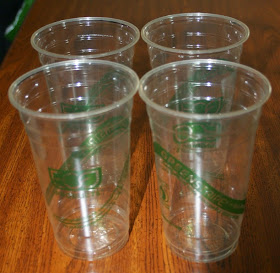.jpg) Some years back, ProfessorRoush ran across some compostable water bottles at a Starbucks in Seattle and, because of the skepticism deeply embedded in my academic soul, I thought it would be a neat idea to try to bring them back in my luggage and test their compost-worthiness at home. Unfortunately, the TSA must have deemed the empty bottles in my checked bags as a potential terrorist threat because the bottles were not in my suitcase upon my arrival at home.
Some years back, ProfessorRoush ran across some compostable water bottles at a Starbucks in Seattle and, because of the skepticism deeply embedded in my academic soul, I thought it would be a neat idea to try to bring them back in my luggage and test their compost-worthiness at home. Unfortunately, the TSA must have deemed the empty bottles in my checked bags as a potential terrorist threat because the bottles were not in my suitcase upon my arrival at home.I was more fortunate last year when I ran into these certified compostable cups at a pizza parlor in Fort Collins, and I was able to ultimately get them into my 65 gallon Lifetime tumbling compost bin by sneaking them home in my car past the marijuana-alert sentries on the Kansas border.
These Eco-Product® cold cups are, as printed on the cups, certified by the BPI, or Biodegradable Products Institute, to be compostable in a municipal or commercial composting facility. The BPI is a "multi-stakeholder association of key individuals and groups from government, industry and academia"....that tests products by written ATSM standards and certifies them. I should reveal here that whenever I see the popular buzzword "stakeholder" these days, my cynical hackles are immediately raised and my blood pressure rises. Materials tested by the BPI must include the ability to "biodegrade at a rate comparable to yard trimmings, food scraps and other compostable materials, such as kraft paper bags," and they must "disintegrate, so that no large plastic fragments remain to be screened out."
I placed the new cups pictured in the top photo into my tumbling compost bin on 5/26/2014, along with mature compost and grass clippings. You can see immediately above this paragraph several periodic photos taken over last summer, a time span when numerous additions of kitchen scraps, grass clippings, other organic materials, and water were composted in the pile alongside these cups. The cups did not disintegrate, as you can see, although they flattened and tore, probably from the repeated tumbling alongside wet and heavy clumps of compost. The organic materials in the bin repeatedly became decent, black homogeneous compost with which any gardener would be happy.
.jpg) This week, almost 11 months after the start of the experiment, I again opened the compost bin and found the cups as photographed yesterday and shown at right. Now, in fairness, I should note that the BPI website states clearly that these products are not meant for home compost piles, but only for "well-managed municipal and commercial facilities." Home composters "typically do not generate the temperatures needed to assure rapid biodegradation of this new class of materials. For this reason, claims are limited to larger facilities."
This week, almost 11 months after the start of the experiment, I again opened the compost bin and found the cups as photographed yesterday and shown at right. Now, in fairness, I should note that the BPI website states clearly that these products are not meant for home compost piles, but only for "well-managed municipal and commercial facilities." Home composters "typically do not generate the temperatures needed to assure rapid biodegradation of this new class of materials. For this reason, claims are limited to larger facilities." That's all well and good, friends, and I can accept that ProfessorRoush is likely a terrible composter, but shouldn't we at least expect that now, 11 months later, the ink would faded and illegible?
Furthermore, and while I'm on a rant, what exactly constitutes an "acceptable municipal facility?" Does my local county recycling facility, which routinely composts leaves and other materials, qualify? It isn't listed at the findacomposter.com website printed on the cups, nor is any other facility within 50 miles of me. How many of these cups would actually make it into a "well-managed commercial facility" anyway, rather than just being tossed into the restaurant waste cans with all the other debris and taken to the usual county shredding facilities? How much more energy and chemical processing is involved in making these cups over the standard red plastic cups that we love to make so much fun of? Which is more likely to be recycled and have the least long-term environmental impact? Is this merely more marketing misinformation to muddle the minds of the masses?
I can't help thinking that while compostable cups make us all feel good, this whole certification system seems designed just to keep us from noticing the man behind the curtain while we slurp the Koolaid of environmental ecstasy. It is only a matter of time before we'll hear offers for a free carton of these cups with every thousand carbon credits we purchase.

I don't usually comment much anymore, but this was just too good a post to pass. Your sentences "Is this merely more marketing misinformation to muddle the minds of the masses?" and "while we slurp the Koolaid of environmental ecstasy" are genius. I personally haven't seen these cups (my lack of love for Starbucks?), but will now know the truth! Loved your experiment!
ReplyDeleteGlad you approve of the wordsmithing. Thanks for commenting!
Delete